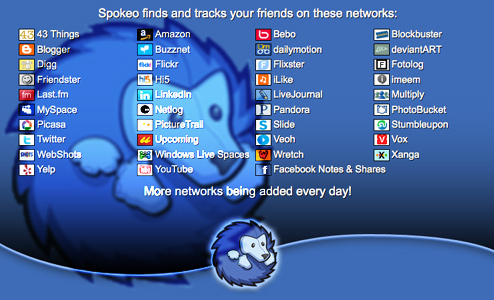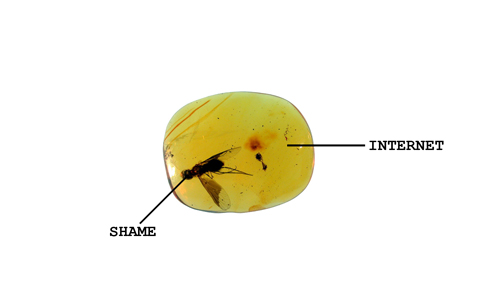internet
../../../..//2008/05/05/nine-inch-nails-is-offering/
Nine Inch Nails is offering their new album for download “one hundred percent free,” on their website. They’ll also release a CD and a vinyl version in July for those of you who like paying for stuff. “The music is available in a variety of formats including high-quality MP3, FLAC or M4A lossless at CD quality and even higher-than-CD quality 24/96 WAVE,” says NIN. Will you buy a record that the band gives away? [NIN]

Amazon Sues Over Law That Forces Them To Collect NY Sales Tax
Amazon has filed a complaint in NY’s State Supreme Court challenging a new law that forces the retailer to collect sales tax on shipments to residents of NY state.

The BBC Writes Application That Steals Personal Info From Facebook
Feel wary about giving applications access to your Facebook page? Worried one of those quizzes or games might be maliciously harvesting your data? You were right to worry. The BBC had the same idea, so they decided to write a program to do just that. And it worked. Not only did it steal the data of Facebook users who installed the application, it also victimized all of their “friends.”

Should The Government Set Up A "Do-Not-Track" List?
One of the most popular sentiments expressed by readers on our blog is “be a smart consumer.” Now two privacy advocacy organizations are calling for the creation of a “do-not-track” list that would protect registered users from online data collection. They argue that a list is needed because too many consumers won’t or can’t understand the methods behind online tracking. To illustrate, one of the organizations “pointed to a 2005 University of Pennsylvania survey in which only 25 percent of respondents knew that a Web site having a privacy policy doesn’t guarantee that the site refrains from sharing customers’ information with companies.” But a do-not-track list is overkill, and a fearful reaction against emerging technologies.

New York State To Start Taxing Amazon Purchases
One of the budget-related changes voted in last week by New York State’s politicians included a new “Amazon tax”:
“Another $50 million will come from requiring online retailers like Amazon that do not have a physical presence in New York to collect sales taxes on purchases made by New Yorkers and remit them to the state.
New York’s argument, based on a reading of the 1992 Quill vs. North Dakota U.S. Supreme Court ruling, is that because Amazon makes sales through affiliates who live in the state, it can be considered to have a physical presence there—which means the new law wouldn’t apply to retailers who don’t use affiliate programs.
../../../..//2008/04/09/man-and-comcast-employee-gets/
Man (and Comcast employee) gets laptop and XBOX back after unleashing mobs of vigilante internetters on the thieves. [Philly Daily News] (Thanks, Markus!)

Comcast Monitors Twitter For Angry Customers?
The brass at Comcast are keeping an eye on Twitter, according to Michael Arrington of TechCrunch. He spewed some bile about Comcast via Twitter and got an immediate response from their internet damage control team.

Can The "Sears Catalog" Save Sears?
When Sears chairman, Eddie Lampert, took over Kmart, he was determined to revive the long dead “blue light special.” Excited about bringing back the old favorite, Lampert’s chief marketing officer called the new campaign a “marketplace of discoveries.”

Qwest Sells Woman "Cheaper" Package That Costs More, Has Unmentioned 2-Year Commitment, And Requires New Modem
Matt’s mom, a longtime Qwest customer, called up the company to switch her long distance over from AT&T. The CSR suggested she switch over to a bundled package that would save her $11 a month and offer faster Internet connection speeds. What the CSR didn’t mention was that the new package required a 2-year commitment, that it wouldn’t work with her current DSL modem, and that it actually came out to about $3 more per month.

ISPs Are Maniacal Stalkers Who Read Your Email And Watch You Surf The Web
Internet service providers are actively tracking 100,000 users, reading every email they send and every website they visit, according to the Washington Post. The report coincides with a damning Associated Press investigation of ISP contracts which finds that they reserve broad rights to read essentially anything you view on the internet without any intervening supervision or regulation.

Identifight Tells You What Sites Your Email Address Is Publicly Linked To
Matthew wrote in to complain about a new website called Spokeo, which sounds like a stalker’s dream: it sucks up all the entries in your address book, then returns a Big Brothery smorgasbord of all the publicly accessible accounts and services linked to each email address, along with updates any time something happens. It might surprise you to see just how easy it is for someone to assemble a picture of your Internet footprint with only an email address.
Don’t like the sound of that? Luckily for you, someone has already been inspired to follow Spokeo’s model and create a tool—Identifight—that lets you track your own email address to see what shows up, so you can patch up privacy leaks.
../../../..//2008/03/27/adobe-has-joined-fotoflexer/
Adobe has joined FotoFlexer, Rsizr, and Piknic to offer a free online image editor, Photoshop Express. ArsTechnica says it’s pretty good for a cross-platform browser app, although it’s got some limitations in this beta launch. (Currently US only.) [ArsTechnica]

Facebook Takes Letting The Whole World See Your Private Photos Seriously
THE QUOTE:“We take privacy very seriously and continue to make enhancements to the site,” said a Facebook spokesperson.

The Man Who Owns DoNotReply.com Knows All The Secrets Of The World
If your company is in the habit of using a “donotreply.com” address in the “From” field of its emails, you might want to forward your IT department this entry from the Washington Post’s “Security Fix” blog—when customers don’t pay attention and reply to a “donotreply.com” email address, it goes to Chet Faliszek, a programmer in Seattle who registered the domain seven years ago.
With the exception of extreme cases… Faliszek says he long ago stopped trying to alert companies about the e-mails he was receiving. It’s just not worth it: Faliszek said he is constantly threatened with lawsuits from companies who for one reason or another have a difficult time grasping why he is in possession of their internal documents and e-mails.





